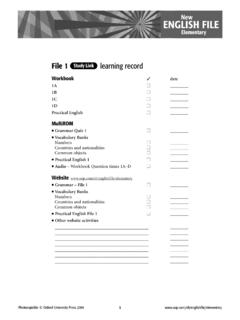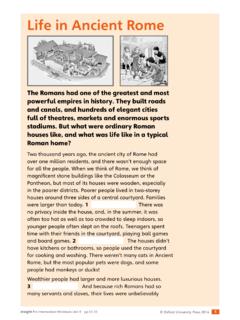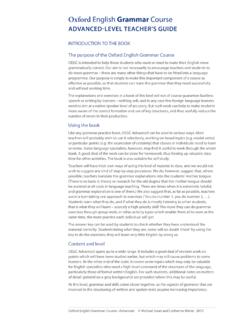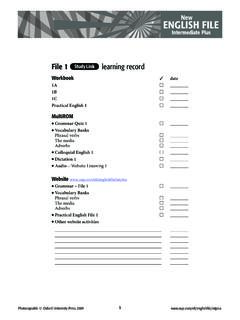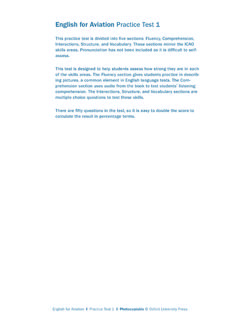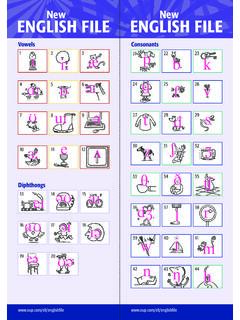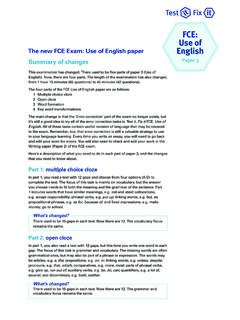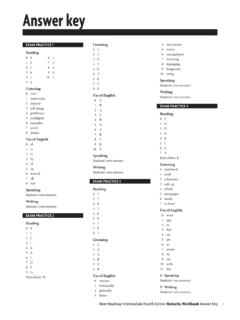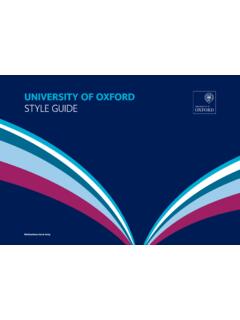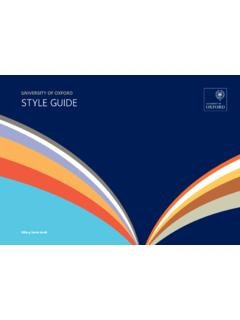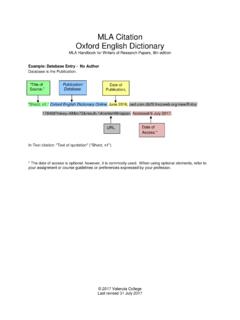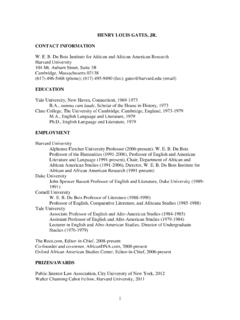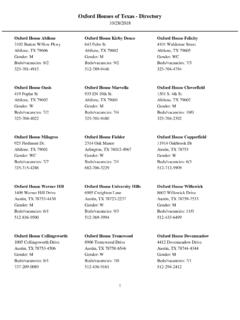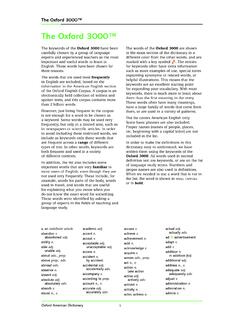Transcription of Basic Oxford - Oxford University Press
1 BasicOxfordPracticeGrammarTestsNorman CoeMark HarrisonKen PatersonTest A: Tenses present 1 Test B: Tenses past 3 Test C: Tenses future 5 Test D: Sentences and questions 7 Test E: Modal verbs 9 Test F: Articles, nouns, pronouns, etc. 11 Test G: Adjectives and adverbs 13 Test H: Prepositions 15 Test I: Verbs, passives, infinitives, -ing forms 17 Test J: Conditionals and reported speech 19 Test K: Building sentences 21 Exit test 23 Basic TestsOxfordPracticeGrammarContentsOxford Practice grammar Basic Test APhotocopiable Oxford University Press 20191 Tenses presentTest AKate and Amber are talking about their daily lives. Complete their conversation using the verbs in brackets ( ) in the Present Simple. Use short forms if you : Do you get up (you/get/up) early?
2 Amber: No, not really. 1 (My sister/go) to the bathroom first at about eight o clock. 2 (not/get up) until about eight thirty. What about you?Kate: Well, 3 (Mike/try) to get me up at about seven, but 4 (he/not/usually/succeed)! Amber: 5 (I/be/not) very hungry in the morning. What about you? 6 (you/eat) much for breakfast?Kate: 7 (I/not/usually/like) to eat much, but 8 (Mike/study) for an hour before breakfast, so 9 (he/eat) quite a : 10 (he/have) a big lunch as well?Kate: 11 (I/not/know). 12 (He/not/tell) me!Amber: 13 (you/drive) to work?Kate: Yes . 14 (there/not/be) any buses. What about you?Amber: Well, 15 (my sister/want) to buy a new car, but at the moment, 16 (we/both/walk).
3 Felix is on holiday in Portugal with his wife, Charlotte, and their children, Tom and Ellie. He s emailing their oldest child, Simon, who is at home in England. If the Present Continuous form is correct, put a tick ( ). If it s wrong, either change the spelling or change it to the Present Simon, How are you geting getting on? We re thinking We think it s great here. Everyone is having a good time. I m siting 1 in the hotel Business Centre. Tom is swiming 2 in the pool. Ellie is lying 3 on the beach, and Charlotte is shoping 4 . We re liking 5 Portugal. We re all relaxing. 6 . What are you doing? Are you working hard 7 at the moment? I m knowing 8 your exams start tomorrow. Good luck! Is it raining 9 in England? The sun is shineing 10 here, of course!
4 I m learning 11 a bit of Portuguese, but not very much. I m understanding 12 some of the things that people say, but only if the words are similar to English. Hope to hear from you soon! Love,DadABTenses: presentOxford Practice grammar Basic Test APhotocopiable Oxford University Press 20192 Hazel and Isaac are on the phone. Complete their conversation using the verbs in brackets ( ) in either the Present Simple or Present Continuous. Use short forms if you : Are you working? (you/work)Hazel: Yes . 1 (I/finish) a piece of homework for tomorrow. Why? What are you doing?Isaac: Well, 2 (I/think) about my homework, but I m afraid 3 (I/not/actually/do) it at the moment. I m tired and bored. 4 (you/want) to go out?
5 Hazel: No. Look at the weather. 5 (it/rain). 6 (I/never/go out) in the rain. By the way, 7 (you/know) the new girl in our class, the one with glasses? 8 (I/think) 9 (she/come) from Venezuela. Anyway, 10 (she/stay) with Peter s family this : Yes, I know. 11 (she/do/well) at school, isn t she? Peter says 12 (she/speak) three languages: Spanish, English and French. 13 (I/not/speak/any languages) other than English!This is the opening part of a book. One unnecessary word has been crossed out already as an example. Find 21 more and cross them is the 1 June 1964. The sun shines is shining and the birds sing are singing. What is does everyone doing do? Well, Mrs Green is reads reading a newspaper. She is reads reading a newspaper every day before breakfast.
6 Her husband, Mr Green, is danceing dancing in the garden. He likes is liking dancing in the morning. Have you another cup of coffee, darling , says Mr I m still drink drinking my first cup, dear , replies Mrs Green, and anyway, where s our daughter today? She is usually bringing brings me my coffee. Mary, says Mr Green (but he doesn t stop dance dancing), she s she works working in London this week. Don t you remember? Stopping Stop dancing and listening listen to me. I never forget forgetting anything. I was just giving you a little test. Anyway, it s time for work. Alright, darling, but don t forget not your briefcase. Thank you, dear. Don t dancing dance too hard! It s the beginning of a new term at University . Complete these sentences for new students, using the words from the ( ) show ( ) smoke ( ) work ( ) check ( ) give ( ) copy ( ) Work hard, but take a break now and again!
7 Don t leave your bags or coats in the lecture that you know all the examination your computer password to another your ID card when you enter the building. 4 in the lecture halls or your essays from the Internet!CDET enses: presentTenses pastTest BAnna is emailing her new Spanish friend, Pilar. If the verb tenses are wrong, correct them. If they are right, put a tick ( ).I ll try to answer some of your questions. I have moved I moved to London from Bristol in 2009. That means I ve been here for almost ten years now. (Wow! Time flies, doesn t it?) 1 I was living in the south of the city when 2 I was starting going out with my husband, Mel. (We were both studying French at the time 3 we have met at University College.)
8 In fact, 4 I ve stayed in flats all over London! My favourite flat 5 had a balcony and you could see a small park in the square. 6 I had never forgotten that flat, or my flatmates. Anyway, that s enough about me. How long 7 have you lived in Madrid? 8 Have you been born there? London and Madrid are so big, aren t they? 9 I didn t see all the different parts of London yet! I saw an old friend by chance about a week ago when 10 I walked to work, and she lives on a boat in north London. 11 I have visited her last week. 12 I ve never seen such a small kitchen! My friend cooked a meal for is talking to her husband. They ve been married for 40 years. Six Past Simple verb forms should be Past Perfect. One has been corrected for you as an example.
9 Find the other five, cross them out and rewrite : We first met in 1977, didn t we, at the cinema? Brian: Yes. When we arrived, the film already film had already begun. Sara: I saw it before anyway. Brian: Really? You didn t tell me that. Sara: No. I wanted you to take me to the cinema the following week! Brian: So you already decided you liked me! Sara: And then you took me to your favourite restaurant, but it closed a week before! Brian: Oh dear. What did we do next? Sara: We went to a pub to meet your friends, but it was empty. Everyone went home, because England was playing Germany at Wembley. Brian: What an evening! Sara: That s not all! When I got home I couldn t open the front door because I left my keys at the pub.
10 ABTenses: pastOxford Practice grammar Basic Test BPhotocopiable Oxford University Press 20193 Tenses: pastAnna is talking to her mother on the phone. Underline the verbs that should be in the Present Perfect Continuous or Past Continuous form, and then correct them. One has been done as an example. Find five more. I m so tired, Mum. I ve studied all day from five o clock this morning. In fact, I did some maths when you rang just now. I still haven t finished and now I ve got a headache because I ve worked harder than I ve ever done before! Sorry, what did you say? You ve never had a problem with maths? But you re a teacher! You ve read books and things all your life! Dad says you learnt French verbs on Saturday morning in the park when he first met you!

